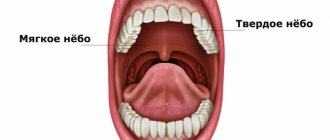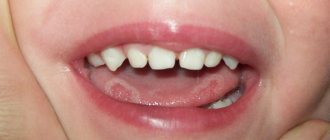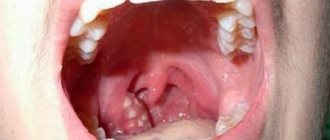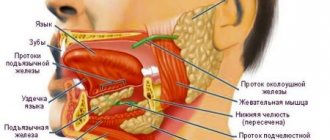Bad odor from the throat and mouth very often worries patients, but not everyone attaches great importance to this deviation. Experts call this phenomenon halitosis. An unpleasant odor can occur not only due to problems with the oral cavity. Many diseases and pathologies are accompanied by this symptom, therefore, to prescribe effective therapy, it is recommended to undergo a thorough examination. Treatment is prescribed based on the results obtained.
What diseases can cause an unpleasant odor?
The cause of an unpleasant odor in the throat can be associated with both normal physiological phenomena occurring in the body and pathological abnormalities. Among the diseases presented, there are serious and minor deviations, but in any case they require timely diagnosis and quality treatment. Experts include the following diseases as the most common provoking factors:
- Lung pathologies, including some forms of pneumonia.
- Liver diseases.
- Pathologies of the nasopharynx and throat.
- Diabetes.
- Oral cavity oncology, malignant formations.
- Diseases of the gum tissue.
- Carious formations.
- Diseases of the pharynx of a bacterial nature.
- HIV.
- Stomach ulcer.
If the patient has been diagnosed with one of the listed diseases, then after it is cured, the bad smell from the throat will disappear.
Other reasons
Halitosis can also be provoked by other reasons that are not associated with diseases of internal organs and systems. These factors include:
- Bad breath in the morning. Saliva is practically not secreted at night, so a favorable environment is created for the development and reproduction of pathogenic bacteria, which provoke unpleasant breath.
- Starvation. The smell will disappear after eating, as saliva will begin to be released intensively.
- Lack of fluid in the body. Provokes a slight secretion of saliva.
- Taking certain medications.
- After drinking alcoholic beverages.
- Eating flavorful foods.
- Smoking.
- Failure to comply with oral hygiene rules.
But you should understand that the listed causes of unpleasant odor from the mouth in most cases are caused by diseases, so you should consult a doctor to identify the pathology.
How is halitosis diagnosed [8]
Often a person cannot objectively judge the presence of gastric odor from the mouth. Suspicious people tend to experience various symptoms that do not exist in reality, and halitosis is no exception [9].
The easiest way to check is to directly ask your loved ones if you can smell it. If you want to avoid discussing such a sensitive topic, you can check whether the dental floss smells a few minutes after brushing your teeth. Another option is to evaluate the smell of plaque removed from the back of the tongue with a teaspoon or napkin (also not immediately, but after a short period of time). You can lick your wrist and smell it when the saliva dries. However, the test result may be affected by recent consumption of spicy foods, onions and garlic, or alcohol.
Laboratory methods for diagnosing stomach odor instruct the patient to abstain from certain foods and drinks, as well as from smoking, the day before the procedure. The doctor can determine the presence of odor using his own senses or a special device - a halimeter.
Interestingly, the test for the presence of H. pylori in the body is also respiratory. When infected by these bacteria, urease is produced, an enzyme that quickly breaks down urea. The patient needs to drink a composition containing urea, which is enriched with a carbon isotope, and then exhale into a sealed container. The resulting sample is sent for analysis. The presence and concentration of bacteria in the stomach is determined by the content of the carbon isotope in the exhaled air.
Diseases of the ENT organs
Various infectious diseases of the ENT organs can provoke an unpleasant odor from the throat. In this case, it is necessary to take into account that halitosis will be temporary and will disappear after treatment. If the patient is constantly bothered by this disorder, it is recommended to be checked for chronic infections of the nasal cavity, pharynx or tonsils.
In such a situation, an ENT specialist pays special attention to the tonsils, since they have a special structure - depressions and lacunae where food debris can accumulate. Therefore, bad throat odor is considered the leading symptom of chronic tonsillitis.
There are cases when even on healthy tonsils one can observe the formation of plugs, which consist of food residues, dead epithelium, bacteria and calcium salts. They are not considered dangerous, but they cause some discomfort to the patient and are accompanied by the same breathing from the mouth.
White lumps from the throat with an unpleasant odor occur for unknown reasons, but therapy is mandatory. The patient is prescribed mechanical removal of formations and preventive measures. In this case, blood and urine tests are required to exclude other diseases of internal organs and systems.
Causes of postnasal drip
The causes of constantly accumulating mucus in the throat can be infectious or non-infectious. These include:
- Inflammatory diseases of the nasopharynx and larynx (sinusitis, pharyngitis, laryngitis). The increased production of mucous secretion during this period is associated with the body’s attempt to clear the airways of bacteria and viruses, thereby speeding up recovery. The fact that mucus is secreted abundantly in this case, on the contrary, is a variant of the norm. Such mucous masses do not interfere, but help get rid of pathogens.
- Chronic diseases of the upper respiratory tract. These diseases cause inflammatory processes in the nasopharynx, resulting in the formation of a constant source of infection here.
- Diseases of the lower respiratory tract (bronchitis, pneumonia, tuberculosis).
- Allergic reactions to an external irritant. An allergy can be accompanied by a copious accumulation of phlegm, which is annoying and makes you want to constantly swallow it.
- Disorders of the gastrointestinal tract, in which the contents of the stomach are thrown back into the esophagus and further into the pharynx (gastroesophageal reflux disease, gastritis, ulcer).
- Features of the structure of the nasal cavity (curved nasal septum, enlarged nasal turbinates).
- Adenoids.
- Poor nutrition - eating too fatty or spicy foods irritates the gastrointestinal tract and can provoke increased secretion production.
- Bad habits. Tobacco smoking and alcohol abuse lead to burns of the pharyngeal mucosa. The body tries to get rid of the harmful effects of harmful substances by intensively producing mucous masses.
- The entry of foreign objects into the nasal cavity is a common cause of the accumulation of mucous masses in the throat of children, since children, while playing, can insert beads, small parts of toys, etc. into the nasal passages.
- Poor environmental conditions in the place of residence - polluted air and dust. In this way, the body tries to get rid of harmful particles trapped in the air.
The sooner the cause of this condition is determined, the sooner effective treatment for the throat will be prescribed and carried out.
Symptoms
A bad smell from the throat may also be accompanied by additional symptoms, which help in making a diagnosis. During the examination, the specialist pays special attention to these signs.
Symptoms of halitosis:
- Pain in the area of damaged and loose teeth.
- Unpleasant sensations in the throat: soreness, pain.
- Drainage of mucus down the back of the throat.
- Breathing problems.
- Heartburn, belching, nausea and vomiting.
- Thirst and dry mouth.
- Unpleasant taste in the mouth.
- Spitting blood.
If the patient has the listed symptoms along with a bad odor, you should immediately contact a specialist and undergo all tests, undergo a full examination of the body in order to establish the true cause of the disorder. If this is not done, the disease will progress, the general condition will worsen, and halitosis will become more intense.
Eliminating odor at home
Patients can also get rid of bad breath using folk remedies; effective methods are:
- carrying out inhalations with a nebulizer;
- mouth rinse;
- performing steam inhalations;
- irrigating the throat with herbal decoctions.
A nebulizer is a special device for inhalation at home. It is used to inhale a sprayed liquid based on decoctions prepared from oak bark, cedar, sage, and lavender.
In the absence of a device, steam inhalations are performed; the following products are often used as raw materials for them:
- lemon juice and honey;
- pine buds along with essential oils;
- liquid obtained from horseradish.
The most convenient and common method is gargling; the following recipes are effective for gargling:
- tincture of alcohol with the addition of calendula;
- eucalyptus composition;
- chamomile decoction;
- hydrogen peroxide;
- tea from St. John's wort, mint;
- a solution of soda and salt;
- iodine composition;
- a medicinal mixture based on Furacilin;
- beetroot drink.
These products have a pronounced disinfectant effect. They allow you to eliminate painful sensations in the throat, cope with putrid odor and discomfort.
Irrigation is an alternative way to get rid of unpleasant sensations in the throat; manipulation is indicated in cases where the patient is not recommended to rinse the mouth. Irrigation is performed using syringes, syringes without needles. Herbal decoctions and mixtures of medications are chosen as a solution for the procedure.
Forms of halitosis
In modern medicine, there are several forms of halitosis, the treatment of which differs. Therapy is prescribed exclusively by a specialist after a thorough examination. Self-treatment cannot be carried out, as it can lead to negative and irreversible consequences.
Forms of halitosis:
- True. Unpleasant odor from the mouth is felt by those around you. This type of disorder is of two types - physiological and pathological. The first includes the smell resulting from fasting, and the second - diseases of the oral cavity and internal organs.
- Pseudoform. The unpleasant odor is not very pronounced, those around them almost do not feel it, but the patient feels insecure.
- Halitophobia. The patient is constantly in an anxious state due to an imaginary unpleasant odor from the oral cavity. In this case, the patient is recommended to consult a psychiatrist.
Only a specialist can determine the form of the disease.
What causes a putrid smell from the throat?
An unpleasant odor does not in all cases cause serious illness in humans. Rinsing the mouth with various herbal solutions is considered a sufficient measure. Dental treatment and basic hygiene eliminate the problem.
When symptoms are additionally accompanied by the discharge of pus, this is a reason to contact a specialist. Mucus along with a putrid odor indicates the development of an abscess in a person. Such a violation is a common occurrence after insufficient treatment of angina. The patient requires urgent hospitalization, during which the pathology is opened and an intensive course of antibiotic treatment is prescribed.
Ignoring the symptoms, expressed in the form of a putrid odor, often causes a person to develop a number of serious complications:
- rheumatism due to poorly treated tonsillitis;
- spread of infection to the kidneys;
- the occurrence of heart disease due to insufficient treatment of sore throat;
- the appearance of constant muscle pain due to intoxication;
- the development of a cancerous tumor, manifesting itself as a lump in the throat.
Constant bad breath, coupled with severe pain in the stomach, indicates the development of a deadly ulcer in a person. This disease often provokes bleeding in the stomach, causing death in the patient.
Poorly treated tonsillitis often manifests itself as unpleasant sensations in the mouth. Ignoring the phenomenon increases the likelihood of a person developing purulent inflammation, against which there is a high percentage of blood poisoning. Such symptoms lead to deadly phlegmon of the neck. All cases require timely contact with appropriate specialists.
Diagnostics
If a patient notices white lumps in his throat with an unpleasant odor, then do not postpone a visit to the hospital. The doctor will pay attention to complaints and severe symptoms and analyze the patient’s general condition. After which it is recommended to assess the severity of odor from the oral cavity. This method is called organoleptic. For the results to be reliable, 24-48 hours before visiting the doctor, the patient should not take hot, spicy foods or use scented cosmetics.
The examination also pays attention to the oral cavity, tongue, throat, larynx, nose and nasopharynx. The patient is prescribed to undergo an X-ray or computed tomography scan of the paranasal sinuses. If the dentist or ENT specialist does not detect any abnormalities, the patient is referred for additional consultation to a gastroenterologist or pulmonologist. A biochemical blood test is required, and attention is paid to the level of kidney and liver enzymes.
Mucus in the throat and nose with an unpleasant odor!
Foul-smelling mucus in the nose and throat is most often caused by a sinus infection (sinusitis) or postnasal drip (mucus running down the nasopharynx and into the throat). Since in these conditions a favorable environment is created for bacteria to multiply in the mucus, which leads to the addition of a foul odor or a nasty taste.
The chronic form of sinusitis manifests itself in thick discharge that has an unpleasant odor and taste. Congestion or inflammation inside the nose is a symptom of rhinitis, which most often causes postnasal drip, when mucus drains from the nasopharynx into the throat.
Thick mucus is an ideal breeding ground for anaerobic bacteria, which is responsible for strong bad breath (known as halitosis). Dentists say that brushing your teeth does not eliminate bad breath caused by mucus draining from the nasopharynx.
Foul-smelling mucus associated with a temporary cold or allergic reaction can be effectively treated with a variety of home remedies that focus on loosening, thinning, and drying out the secretions. A known method to eliminate the problem is to drink plenty of warm drinks, such as soups and herbal teas.
Treating the sources of excess mucus production and eliminating the proliferation of anaerobic bacteria that thrive in this type of environment is the best way to prevent and eliminate mucus or bad breath associated with draining into the nasopharynx.
Although rare, some may experience green or black crusts inside the nose that bleed and produce a foul odor. This is a sign of a disease such as chronic atrophic rhinitis (ozena).
Sinusitis is a common cause of an inflamed and blocked nasal passage, and can produce foul-smelling mucus. This is a condition in which the lining of the sinuses becomes inflamed. The inflammation and swelling is usually caused by a viral infection and often improves within two or three weeks.
This is a very common disease. In temperate climates, the disease affects about 5-15% of the adult population every year.
Sinuses (paranasal sinuses) are small air pockets that are located in the forehead, cheekbones and eyes.
They protect the body by capturing microbes. Bacteria or allergens can cause too much mucus to be produced, which can block the sinuses from opening. So most people will experience a runny nose when they have a cold or allergies.
The buildup of mucus can promote the growth of germs in the sinus cavity, leading to bacterial or viral infections. Most are viral and may clear up in a week or two without treatment. The accumulation of secretions in the nasal passage and throat can cause bad breath and foul-smelling mucus.
Corticosteroid drops or spray may be used to treat such inflammations. Corticosteroids, also called steroids, are a group of medications that can help reduce inflammation. If swelling or inflammation persists, your doctor may prescribe another treatment option.
Other symptoms, such as a stuffy nose, can be treated by applying a warm compress, and the pain can be relieved with painkillers. Antibiotics may sometimes be used to treat a mild bacterial infection that accompanies sinus inflammation.
Signs and symptoms:
- Thick and greenish nasal discharge
- Nasal congestion that causes difficulty breathing
- Pain, swelling, tenderness and pressure around the eyes, cheeks, nose and forehead
- Strong headache
- Ear pressure
- Fever and fatigue.
Tonsillitis
Another possible cause is tonsillitis, an inflammation of the tonsils, the oval pads of tissue at the back of the throat. Symptoms of the disease include swollen tonsils, sore throat, difficulty swallowing and tender lymph nodes on the sides of the neck.
Tonsillitis is often caused by a virus, and a bacterial infection can sometimes cause swelling. The correct treatment depends on the underlying cause of the disease. Therefore, to receive proper treatment, it is necessary to establish a diagnosis quickly and accurately. A doctor may recommend surgery when bacterial tonsillitis occurs too frequently, does not respond to other treatment options, or has other serious complications.
Inflammation may affect other areas of the throat, such as the adenoids and lingual tonsils. There are different variations of the disease: acute, recurrent and chronic. In all three variants, sore throat and problems with swallowing are observed.
Postnasal drip
Nasopharyngeal drip, also known as postnasal drip, occurs when the nasal mucosa is oversecreted. Excess mucus accumulates in the throat or back of the nose. It is responsible for hydration and also helps to trap and destroy foreign organisms such as bacteria and viruses before they can cause infection.
With normal secretion, mucus is invisible, it mixes with saliva and flows harmlessly behind the throat, and the person swallows it. When the body produces more of it and it becomes thicker than usual, it becomes more noticeable. This usually occurs during inflammation, most often during rhinitis.
The accumulated mucus also provides a good breeding ground for bacteria that cause bad odor. When excess secretion comes out of the nostrils, it causes a runny nose as it flows down the back of the throat - called postnasal drip.
The problem can be caused by colds, flu, allergies, sinus infections, pregnancy, or changes in weather.
Depending on the diagnosis, possible treatments include:
- Antibiotic to treat bacterial infection
- Surgery in cases of chronic sinusitis
- Medicines and spray against allergies
- Antacid when gastroesophageal reflux disease is the problem.
Nasal polyps
Nasal polyps are soft, painless, irregular growths on the lining of the nose. They occur as a result of chronic inflammation due to asthma, recurrent infections, allergic reactions and sensitivity to drugs or immune disorders.
Small polyps are asymptomatic, but large polyps or a group of polyps can lead to breathing difficulties due to blockage of the nasal passage, and in some cases also loss of the sense of smell and frequent infections. Although they are more common in adults, they can affect a person at any age.
Your doctor may prescribe medication to shrink or eliminate nasal polyps, but surgery is sometimes required to remove them. They may return frequently even after consistent treatment. Unlike polyps that form in the colon or bladder, nasal polyps are rarely cancerous. They are also not painful to the touch.
Symptoms:
- Runny nose
- Annoying snoring
- Decreased sense of smell
- Severe headaches and facial pain
- Pain in upper teeth
- Postnasal drip.
Inflammatory nasal discharge in adults with odor
In adults, a common cause of foul-smelling mucus is rhinitis, which is an inflammation of the nasal passage. This condition is known to cause a runny nose and nasal discharge.
Rhinitis can be temporary, when it is caused by an allergic reaction, or chronic, when symptoms last more than six weeks. In moderate cases of congestion, the condition may improve on its own; in chronic or severe cases, it is necessary for a doctor to diagnose the condition and prescribe treatment.
In an adult, another common cause of the problem may be sinusitis - inflammation of the sinuses. Sinuses are air-filled cavities located behind the forehead, eyes, cheekbones, and bridge of the nose. They filter the air you breathe, using mucus to trap dirt, bacteria, and other potentially harmful particles.
The sinuses become inflamed or swollen during infections or allergic reactions. The accumulation of mucus creates a favorable environment for bacteria to grow and multiply, resulting in a foul-smelling bacterial infection.
A sinus infection is manifested by the following symptoms:
- Nasal congestion
- Bad breath
- A sore throat
- Thick yellow or green mucus that appears in the nose or throat
- Cough, especially at night
- Dulling of taste and smell.
Mild cases of the problem in adults may improve on their own. In severe cases caused by allergic rhinitis, sinusitis or postnasal drip, immediate medical attention is recommended. People with allergies or a weak immune system are most likely to develop a sinus infection.
Treatment involves not only monitoring and managing symptoms, but also getting rid of the underlying cause of the disease. For allergic rhinitis or sinus inflammation, it is important to have a doctor diagnose the problem and prescribe the necessary medications. In this way, the risk of complications can be minimized.
After a medical examination, treatment will depend on the underlying cause of the disease or the severity of symptoms.
Antibiotics
Sinusitis caused by a viral infection does not require antibiotic treatment. For a bacterial infection, an oral antibiotic may be used. It can be suspected if there is facial pain, nasal discharge that resembles pus, and other symptoms that persist for more than a week. Infection may also be suspected when the condition does not respond to other medications.
Acute bacterial infection is treated with antibiotic therapy. Antibiotics work by killing or preventing the growth of bacteria that can cause a sinus infection. When they are used for treatment it is necessary to remember that:
- The number of days you use antibiotics depends on your overall health
- The choice of drug depends on the body's reaction to it
- The medication may be used with another drug such as a decongestant
Decongestant
A nasal spray can quickly help relieve congestion and swelling. There are many such products on the market.
But they also have their drawbacks, due to which they cannot be used for more than a few days. Most decongestant sprays contain the preservative benzalkonium chloride, which causes toxic reactions in the nose, eyes, ears and lungs and can worsen the symptoms of allergic rhinitis. Thus, a drug with this substance in its composition will be effective immediately, but when the symptoms return within a day or two, they will be worse than before use.
Nasal steroid spray
Nasal steroid sprays are commonly used medications that are used to relieve swelling in the nose. The medicine can also be used for allergies such as hay fever. Steroid sprays are also good for relieving symptoms of inflammation caused by other conditions.
A nasal corticosteroid spray reduces swelling and mucus in the nasal passage. It may also be effective in relieving associated symptoms, such as a runny nose, sneezing, congestion, itching, or swelling of the nasal passage.
Painkiller anti-inflammatory drugs
Paracetamol, aspirin, ibuprofen and other NSAIDs can be used to help combat the fever and headaches that may accompany swelling and inflammation. Various brands of pain relievers can be found in pharmacies.
Surgery for chronic sinusitis
Sometimes surgery may be performed due to a complication of sinusitis, which may include the formation of pus in and outside the sinus. The purpose of the operation is to drain the sinuses:
- Removing infected, swollen or damaged tissue
- Removing swollen bone to create a wider opening to drain mucus from the sinuses
- Getting rid of formations inside the nose
- Removing a foreign object blocking the nasal passage.
Surgery does not always completely correct the problem, and some people will require a second operation. When treating a swollen, infected nasal passage, the surgery becomes more effective when used in conjunction with another medication.
Folk remedies
Peppermint oil.
It is suitable for oral and topical use and has antimicrobial properties. Along with lavender, peppermint oil may be one of the most versatile essential oils in the world.
Drinking warm liquids can also help keep your body temperature normal.
and relieve some cold symptoms, such as sneezing and runny nose.
Salt.
You can also try gargling, or even better, rinsing the nasopharynx with salt. It has strong antibiotic, anti-inflammatory and antiseptic properties that help fight bacterial infections in the mouth.
Ginger.
Although the root of this plant does not help stop the discharge process itself, it can help get rid of the mucus that remains after the disease has been treated. It is an ancient remedy that has been used in many cold and cough medicines.
Raw honey.
It is an antibacterial, anti-inflammatory and antifungal home remedy. It also contains antioxidants and flavonoids, and not only reduces mucus secretion, but also soothes irritated airways.
This article is for informational purposes only. An otolaryngologist at the Company’s Polyclinic can tell you in more detail about the prevention of ENT diseases (mentioned in this publication).
In your free time, call the call center at 8 (495) 356 3003 and make an appointment with an otolaryngologist.
The clinic "Innovative Technologies" LLC thanks you for
that you took the time to read this information.
Is it necessary to remove tonsils for halitosis?
Many patients ask questions: “How to remove bad odor from the throat? Is it necessary to remove the tonsils? Only a specialist can answer them for sure. If a patient is often diagnosed with tonsillitis, it is recommended to surgically remove the tonsils to get rid of halitosis.
After the operation, the patient’s condition will improve significantly, putrefactive plugs and food debris will no longer accumulate in the throat. Thus, the favorable environment for the proliferation of pathogenic microorganisms will disappear. However, tonsil removal is considered a radical method that is rarely used.
In modern medicine there are other ways to solve this problem. For example, the constant removal of plugs by washing the tonsils. To consolidate the positive result, the patient is advised to use medications that will stimulate the immune system and prevent exacerbation of chronic tonsillitis.
Treatment of halitosis
Treatment of unpleasant odor can be carried out in several ways: medication, folk remedies and rinsing. Drug therapy is based on the provoking factor. If halitosis was caused by plugs on the tonsils, then the patient is prescribed antibacterial agents, immunostimulants, physiotherapeutic methods and rinsing. Treatment in this case should last no more than 10 days.
As for antibiotics, it is recommended to take them from the first day after the formation of plugs. The doctor may prescribe Ceftriaxone, Cefin or Augmentin. How can you gargle to get rid of an unpleasant odor? Antiseptics can be used for this: “Furacilin”, “Angilex”, “Dioxidin”. The procedure is carried out at least 4 times a day. To strengthen the immune system, it is recommended to take Levamisole. For chronic rhinitis, antiviral drugs are used to help get rid of flu, colds and runny nose. It is also possible to use antihistamines.
Bad smell from the throat without coughing can be eliminated using folk remedies. The patient is recommended to carry out inhalations, rinse the mouth with herbal decoctions - sage, oak bark, lavender essential oils. If it is not possible to rinse, then irrigation can be done. Folk remedies should be used in conjunction with medications.
Treatment of tonsillitis plugs
The appearance of plugs always indicates a long-term inflammatory process, so you should know not only how to treat purulent plugs on the tonsils, but also combine removal with measures to treat chronic tonsillitis in general. To do this, you should consult an otolaryngologist. Conservative treatment consists mainly of the use of medications. Anti-inflammatory therapy may also be prescribed. One way to cope with a sore throat and inflammation is to take the drug Tonzilgon® N. This is a herbal remedy that is widely used to treat acute and chronic tonsillitis. The drug helps reduce inflammation and sore throat and prevent the occurrence of new exacerbations.
In most cases, it is advisable to resort to medicinal gargling. The doctor may prescribe an antiseptic solution based on chlorhexidine or furacillin. In consultation with a specialist, inhalations can be performed. Rinsing the lacunae of the tonsils is a procedure that allows you to get rid of plugs; it is carried out strictly by a specialist using a syringe and a medicinal solution or using a special apparatus.
Surgery
A tonsillectomy is an operation to remove the tonsils. A radical method of treatment is used only according to strict indications, in cases where drug therapy does not give the desired results, and plugs continue to form again. The doctor will suggest treating pus in the tonsils by removing them if there is a high risk of complications in the heart, joints, too frequent relapses and exacerbations of tonsillitis.
ethnoscience
Removing tonsil plugs using folk remedies is not recommended. They can be located deep in the gaps, and besides, this is risky - the inflammation can intensify. Using rinses, you can soften the surface of the plugs to make them easier to remove. As a rinse solution, you can only use liquids at a comfortable temperature: a weak saline solution, a solution of water and soda, a warm chamomile infusion in the absence of allergic reactions.
How to clean plugs
Doctors do not recommend self-medication: the presence of traffic jams is a good reason to visit a specialist. Independent attempts to remove plugs can cause injury to lymphoid tissue, the development of serious bleeding, and the spread of the inflammatory process. A relatively safe method of removing plugs is to squeeze them out with the handle of a teaspoon or a spatula: only you need to press not on the tonsil itself, but on the side of it - on the very arch itself, behind which it is hidden. When pressing on the tonsils, the contents of the lacunae are brought out. It is important to rinse thoroughly before and after the procedure to remove blockages from the mouth.
Preventive actions
Prevention of halitosis consists of full compliance with all specialist recommendations. The patient is advised:
- Maintain oral hygiene.
- Conduct timely treatment of diseases of teeth and gum tissue.
- Treat diseases of the throat, nasal cavity and ears.
- Do not trigger pathologies of the gastrointestinal tract.
- Constantly humidify the air in the room.
- If you have chronic tonsillitis, then regularly wash the tonsils.
- Lead a healthy lifestyle. Avoid drinking alcoholic beverages, smoking tobacco, playing sports, spending time in the fresh air more often, and observing work and rest schedules.
Also, with this disease, it is worth eating properly and balanced. Avoid canned, fried and spicy foods. At the same time, meals should be fractional, in small portions; you should not overeat, especially if diseases of the gastrointestinal tract are diagnosed.
What measures should be taken to prevent halitosis?
Visiting the dentist at least twice a year and practicing good oral hygiene is a good way to prevent halitosis. It's important to know that it's not just your teeth and dentures that you should brush. Plaque on the tongue is an environment in which bacteria readily multiply, so it is necessary to get rid of it. To do this, you can use a Colgate® 360° toothbrush, which has a special scraper on the back. To suppress bacteria growth throughout the day, it is helpful to use an antibacterial mouthwash such as Colgate® Total.










